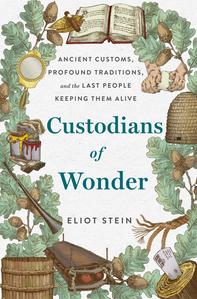
 The subtitle of journalist Eliot Stein's volume of fascinating profiles of rare artisans--"Ancient Customs, Profound Traditions, and the Last People Keeping them Alive"--aptly captures the rare vocations of the 10 people profiled, several of which were adapted from stories he originally wrote for the BBC.
The subtitle of journalist Eliot Stein's volume of fascinating profiles of rare artisans--"Ancient Customs, Profound Traditions, and the Last People Keeping them Alive"--aptly captures the rare vocations of the 10 people profiled, several of which were adapted from stories he originally wrote for the BBC.
Each custodian's practice--most acquired through apprenticeship passed down through generations--takes years to master. Together, Stein's pieces create a mosaic of disappearing arts and lifestyles. He describes the larger-than-life creations of a movie poster painter in Taiwan; the quiet of Germany's Dodauer Forest, where a mighty 500-year-old oak brings lovers together; and a Sardinian pasta at the center of Italy's Feast of San Francesco, influenced by its place at the crossroads of Europe, Africa, and the Middle East.
Custodians of Wonder demonstrates that it's impossible to appreciate the artistry of each without also understanding the origins of their work, so intrinsic to their birthplace, its geography and history. Stein traces the changes in Japan after World War II that contributed to a movement away from traditional techniques of making soy sauce, which involves "centuries' worth of black bacteria" and kioke cedar barrels, the construction of which has nearly vanished; and the history of Cuba through its cigar factory lectors--the people who have read newspapers and literature to the cigar rollers for more than 150 years. He discusses balafon players of Mali, in West Africa, dating back to Balla Fasséké, who foretold the coming of the Lion King, Sundiata (inspiration for the Disney movie and Broadway play); for 27 generations, the male members of the Kouyaté family have served as their country's balafon players, as well as Mali's "living history books."
The most moving pair of biographies portray artisans who have no clear heir to their expertise and wisdom, mostly due to the ways of modern life. One is "the Last Inca Bridge Master," Victoriano Arizapana. Stein's description of this braided grass pathway over the Apurimac River, high in the Peruvian Andes, and the man who maintains and annually rebuilds it, is nothing short of astonishing--a modern lens into an ancient practice: "There's something truly singular about witnessing someone do something that nearly nobody else in the world knows how to do. It's like watching a secret." Stein creates a similar effect with the story of Paola Abraini, who learned to make su filindeu (which translates as "the threads of God")--the centerpiece of Sardinia's biannual feast--from her mother-in-law. No one has yet mastered her magical way with semolina wheat, water, and salt.
Stein's 10 tales implicitly urge readers to slow down and absorb the astonishing world, beginning with the traditions one holds most dear. --Jennifer M. Brown
Shelf Talker: Journalist Eliot Stein, with this moving debut book, takes readers deep inside the lives of 10 fascinating people whose wondrous work might otherwise go unnoticed.

